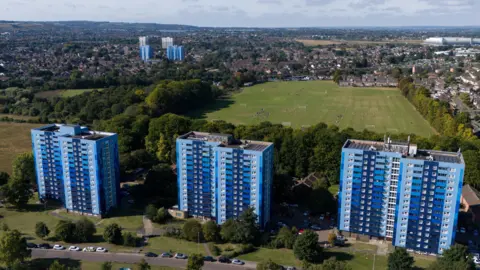What drives someone to commit such unimaginable acts of violence? The tragic case of Nicholas Prosper and the Luton killings is a heartbreaking reminder of the complexities of mental health, familial relationships, and community involvement. It raises questions about our responsibility to recognize and intervene in troubling situations before they spiral into tragedy. Let’s take an in-depth look at this devastating incident and its far-reaching implications.
Incident Overview
Nicholas Prosper, a 19-year-old from Luton, became infamous for committing a series of horrific acts against his own family. In an unspeakable tragedy, he murdered three family members including his mother, brother, and sister in their home. The shocking details of his actions have left a community reeling and searching for answers.
The Victims
The brutality of the killings cannot be understated. Prosper executed his mother and two siblings using a firearm, leaving all three with gunshot wounds. In a particularly gruesome act, his brother suffered over 100 knife wounds. The nature of these attacks highlights the extreme violence that characterized his actions.
Planned Attack
Nicholas did not stop with his family; he had a chilling plan to carry out a mass shooting at St. Joseph’s Catholic Primary School. He carefully chose the date for its notorious association—Friday the 13th—hoping to create a lasting legacy of infamy. His goal was nothing less than the deaths of 30 children and staff members. Imagining such a horrifying scenario can leave anyone feeling unsettled.
Obsession with Violence
What drives someone to such extreme lengths? In Prosper’s case, his fascination with violence played a significant role. He extensively researched previous mass shootings, seemingly infatuated with the idea of being remembered for his actions. His desire was not only for notoriety but for achieving the highest casualty count possible in a school shooting. Understanding his motives, rooted in a craving for attention and infamy, is crucial in understanding the tragedy as a whole.
Failed Gun Purchase
Before the murders, Nicholas attempted to buy a firearm to execute his violent plans. Initially, he faced obstacles in his pursuit, failing to acquire a gun. However, he was undeterred, later arranging to purchase a shotgun and cartridges. The ease with which Nicholas sought a weapon raises important discussions about gun control and mental health awareness, and how these systems can sometimes fail to prevent tragedies like this one.

Police Intervention
Fortunately, the authorities acted swiftly following the murders. Police apprehended Prosper shortly after the events unfolded, effectively preventing him from carrying out his planned attack on the school. This moment is deemed critical by officials, as it signifies a potential turning point in what could have escalated into a more extensive tragedy. The quick response underscored the importance of vigilance and the need for rapid intervention in crisis situations.
Behavioral Profile
Following the incident, mental health experts assessed Nicholas Prosper in a bid to comprehend his actions. While there were indications of traits consistent with the autistic spectrum, professionals concluded that his violent behavior was less about ideological beliefs and more about a desperate yearning for infamy. This distinction is crucial, as it helps in understanding not just Nicholas but also how such individuals may fall through the cracks in preventive measures.
Family and Community Impact
The ripple effects of Prosper’s actions extend beyond the immediate deaths of his family members. His father expressed immense heartbreak, describing the devastation that enveloped their family. The loss of three loved ones in such a brutal manner leaves a void that cannot be filled. Furthermore, the Luton community remains in shock, grappling with the reality that such violence could erupt from within.
Emotional Toll on Families
When families face tragedies like this, the emotional toll can be overwhelming. Victims’ families often endure a lifetime of grief, guilt, and unanswered questions. It is essential to recognize that the impact of such incidents goes beyond the immediate victims. There’s a profound need for support systems in place for those left behind, as they navigate the painful aftermath.
Community Shock
Communities grappling with incidents of violence must contend with feelings of safety and trust among their residents. The trauma lingers, leading to fear and uncertainty. Luton, still reeling from the shock, now faces the ongoing struggle to heal and rebuild a sense of normalcy. Conversations about mental health, violence prevention, and community support are crucial in moving forward.

Legal Ramifications
In the wake of these tragic events, the legal consequences for Nicholas Prosper were swift and severe. He received a life sentence, with a minimum of 49 years in prison, ensuring he would have little chance of reintegration into society. Additionally, he faced multiple charges related to his actions, including the possession of indecent materials, illustrating the far-reaching implications of his behavior.
Justice Served?
While a life sentence may provide some solace to the victims’ families, questions linger about the justice system and its efficacy in preventing such tragedies. The dialogue surrounding justice often extends to issues of mental health and societal responsibility. It points to a broader conversation about how communities can better recognize and intervene in troubling situations.
Systemic Gaps
As authorities pursued justice for the victims, they simultaneously began investigating the systemic gaps that allowed Nicholas Prosper’s plans to unfold. These inquiries aim to answer critical questions about prevention. How could someone with such alarming intentions navigate the system without alarming anyone? Identifying these flaws is essential to prevent future tragedies and ensure that warning signs are taken seriously.
Continued Investigation
The aftermath of the Luton killings has prompted ongoing investigations. Authorities are working diligently to understand how Nicholas Prosper was able to plan and execute his actions, ensuring that similar incidents can be avoided in the future. This commitment to understanding systemic failings is crucial in establishing safeguards for our communities.
Learning from the Tragedy
Each inquiry into incidents of violence presents an opportunity to learn and improve. Moving forward, there should be a concerted effort to identify warning signs, enhance mental health support, and implement preventative measures in communities. Understanding the motivations and circumstances that lead to such violence is not just an academic exercise—it is essential for protecting lives.
Community Collaboration
Strengthening community ties can play a vital role in preventing future tragedies. Encouraging open dialogue about mental health, signs of distress, and the importance of seeking help can create an environment where individuals feel supported. It’s about fostering a culture where people look out for one another and take warnings seriously, whether they come from individuals themselves or their friends and families.

Final Thoughts
The case of Nicholas Prosper and the Luton killings is a devastating chapter in the story of familial violence and community tragedy. It raises profound questions about mental health, the responsibility we share, and the systems we must strengthen to ensure safety. While the scars of this event will linger in the minds of those affected, conversations sparked by this tragedy can provide a pathway toward change.
By examining the circumstances surrounding these events, we can better understand the need for vigilance and collective responsibility. The pain felt by the victims’ families and the broader community can serve as a driving force for change, compelling us to act in the face of distress and to prioritize the well-being of those around us.
In a world where such events can occur, it’s a reminder that everyone has a role to play in recognizing the signs of impending tragedy. Through education, awareness, and active intervention, we can work toward preventing future horrors and fostering a community where compassion reigns.